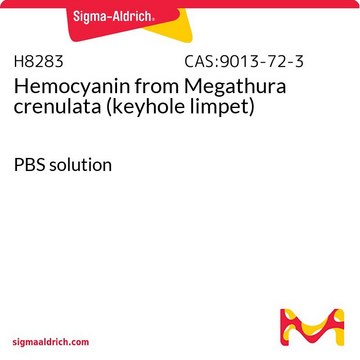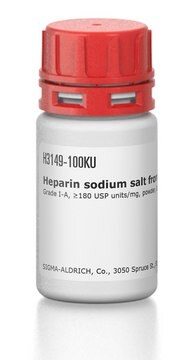374817
Hemocyanin, Keyhole Limpet, Megathura crenulata, Glycerol
Hemocyanin, Keyhole Limpet, Megathura crenulata, Glycerol, is a large, multi-subunit, oxygen-carrying, metalloprotein that is used as a carrier protein in the production of antibodies.
Sinónimos:
Hemocyanin, Keyhole Limpet, Megathura crenulata, Glycerol, KLH
Iniciar sesiónpara Ver la Fijación de precios por contrato y de la organización
About This Item
Productos recomendados
Quality Level
assay
>90% (size exclusion chromatography)
form
liquid
manufacturer/tradename
Calbiochem®
storage condition
OK to freeze
color
clear blue-gray
shipped in
ambient
storage temp.
2-8°C
General description
Carrier protein that has many available primary amines to facilitate protein conjugation. Used to immunize animals to elicit antibodies to small molecules (haptens) by covalent conjugation. Protein: ≥10 mg/ml. Sold on the basis of protein content.
Packaging
Please refer to vial label for lot-specific concentration.
Warning
Toxicity: Standard Handling (A)
Physical form
In 10 mM MgSO₄, 5 mM BES, 50% glycerol, 0.9% sodium chloride, pH 6.5.
Preparation Note
Further dilute with PBS or physiological saline. Material can be dialyzed to remove the glycerol or used as is for conjugation with glutaraldehyde, carbodiimide, or mixed anhydrides.KLH is an extremely large protein complex that has a tendency to aggregate and precipitate from solutions. Use a buffer when diluting KLH and maintain the magnesium concentration at ≥10 mM. Store KLH solutions at 4°C. DO NOT freeze, vortex or agitate to dissolve KLH. Freezing or agitating KLH will cause protein aggregation and precipitation.
Other Notes
Hayashi, K., et al. 1992. Virchows Archiv. B Cell Pathol.63, 37.
Shuler, K.R., et al. 1992. J. Immunol. Methods156, 137.
Shuler, K.R., et al. 1992. J. Immunol. Methods156, 137.
Legal Information
CALBIOCHEM is a registered trademark of Merck KGaA, Darmstadt, Germany
Storage Class
10 - Combustible liquids
wgk_germany
WGK 2
Certificados de análisis (COA)
Busque Certificados de análisis (COA) introduciendo el número de lote del producto. Los números de lote se encuentran en la etiqueta del producto después de las palabras «Lot» o «Batch»
¿Ya tiene este producto?
Encuentre la documentación para los productos que ha comprado recientemente en la Biblioteca de documentos.
Nuestro equipo de científicos tiene experiencia en todas las áreas de investigación: Ciencias de la vida, Ciencia de los materiales, Síntesis química, Cromatografía, Analítica y muchas otras.
Póngase en contacto con el Servicio técnico







